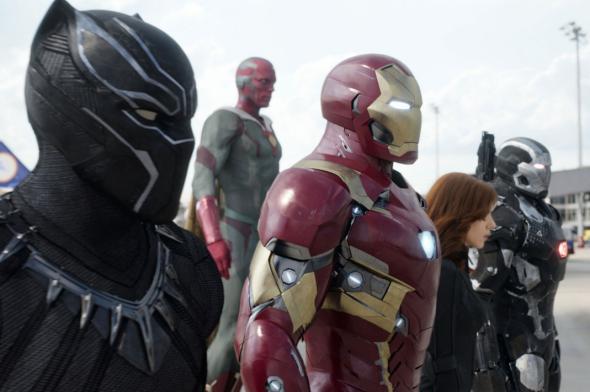This article originally appeared in Vulture.
Last year, when Marvel Studios and Sony announced that they’d reached an unprecedented rights-sharing deal that would allow Spider-Man to appear in the Marvel Cinematic Universe, one could be forgiven for feeling a pang of preemptive annoyance. Sure, we’d get to see the wall-crawler appear alongside the Avengers, and that would certainly be fun. But we were also getting yet another Spidey reboot—and that might mean having to see his origin story yet again. How many times must we dig up the corpse of Uncle Ben and murder him again in order to teach li’l Peter Parker about great power, great responsibility, and how the twain meet? The guy’s second only to Batman’s parents in terms of ad nauseum homicide.
But in Captain America: Civil War, something miraculous happens. We get a brand-new Spider-Man, played with pubescent glee by Tom Holland, and … Uncle Ben isn’t mentioned once. Nor is there any talk of a radioactive spider bite. The web-head simply springs into the MCU, fully formed, already slinging those wonderful webs. For that matter, the movie doesn’t seem very interested in how any character came to be. Civil War is a superhero movie that doesn’t waste time on origin stories—and it’s a better superhero movie for it. Spoilers ahead.
Before we go any further, it should be noted that origin stories can be terrific. Some of the best superhero films feature them prominently: Batman Begins and the 1989 Batman both feature engrossing looks at how a single trauma can lead a person to obsession; Captain America: The First Avenger demonstrates how one’s direction in life can be altered by world events; Unbreakable is a thrilling meditation on the way we reckon with self-discovery, and so on. Plus, if a major figure is being introduced to audiences for the first time, it can certainly be confusing to see that person and know nothing about how they became more than human.
The key here is moderation. You don’t need to jam such arcs into every superhero movie—and if you do have to have one, you don’t always benefit from spending long stretches of time on it. There are so many other interesting things you can do in a superhero narrative, and Civil War gives itself the space to do a lot of them. Being that there are two significant character introductions in the movie, it was safe to assume that we’d have to see some manner of establishing backstory—and while there is for each hero a smidge of explanation, there’s nothing like a full who-they-are-and-how-they-came-to-be spiel.
Most notably, we meet Chadwick Boseman’s T’Challa, aka Black Panther, who will be getting a solo MCU film in 2018. His dad is the king of a reclusive East African country called Wakanda; his dad gets killed; T’Challa becomes king and decides to go after the person he thinks killed his dad. That chain of events takes, oh, maybe three minutes of screen time? Then he’s off to the races with his superhero-ing.
More important, we get zero explanation of why he’s the Black Panther. After his father’s assassination, he tells Black Widow that he already is something called the Black Panther. Soon afterward, we see him in a sleek black jumpsuit with little retractable claws, fighting like an expert. There’s no laborious explanation of his powers, no flashback to the day he first donned his cat ears. We’ll likely get a dive into his path to power in Black Panther, but we don’t get it here because we don’t need it.
Far from making things more confusing, T’Challa’s a priori nature keeps the movie from getting cluttered with excess information. The closest thing to a traditional origin story the movie has comes near the very end of the movie, when our villain sits on a mountain and does a little bit of explaining about why he hatched his plot. But it’s not much of a story, really. He spends about a minute recounting a thing that happened to him and why it made him angry, and never once do we flash back to any of it.
This is a stark contrast with the other MCU offerings: All of them spend a lot of time establishing at least one hero or villain. You could argue that The Avengers is an exception, but it’s basically two hours of a team’s origin story. It can start to feel a little repetitive after a while. Same goes for DC Comics–based hits like The Dark Knight Rises, Man of Steel, and Batman v Superman: Dawn of Justice. The latter movie didn’t just use Batman’s origin to explain his whole deal, it also used it as the catalyst for his climactic truce with Supes. Aren’t we familiar enough with Batman and Superman at this point to eschew such plotlines and devote more screen time to playing around with their archetypes, rather than building them up again?
It remains to be seen if next year’s Spider-Man: Homecoming, the first solo movie about this newest incarnation of Spidey, will delve into the fateful nip from a spider and the murder of poor Uncle Ben. It’s probably inevitable that there will be some mention made of that path to power and responsibility. But given that very few people are going to go home from Civil War scratching their heads and wondering who this spider-powered gent is, hopefully Marvel and Sony will recognize that we’re already onboard with him and get right to the business of weaving a solid, spandex-clad yarn.
See also: Why the Movie Captain America: Civil War Didn’t Have the Comic Book’s Dark Ending
